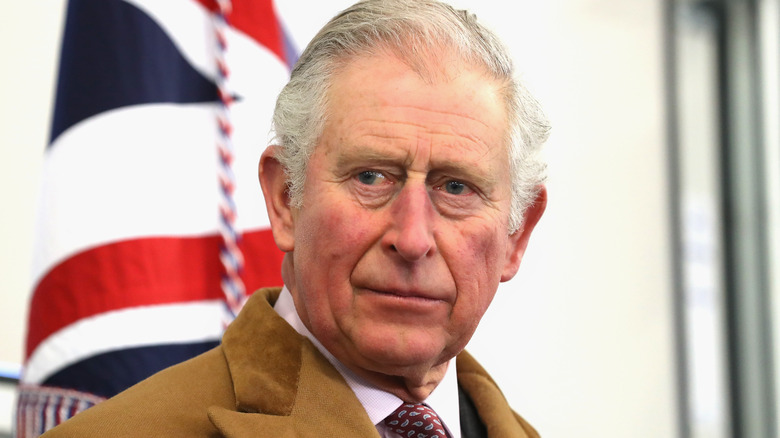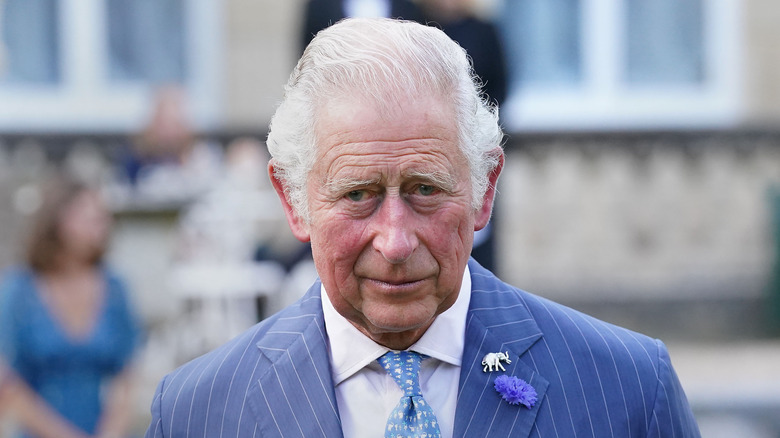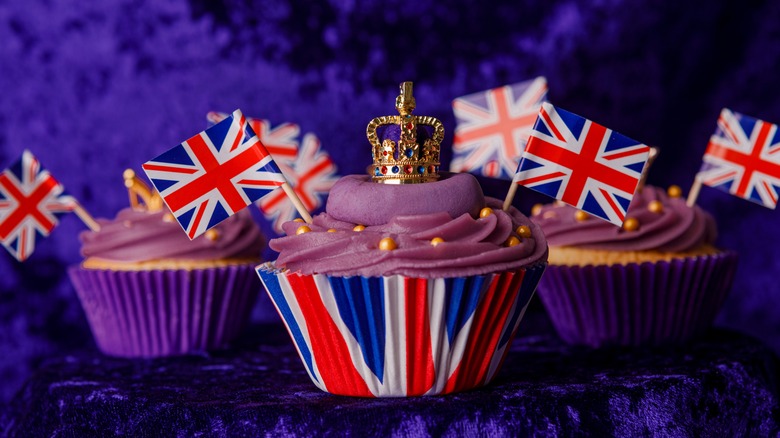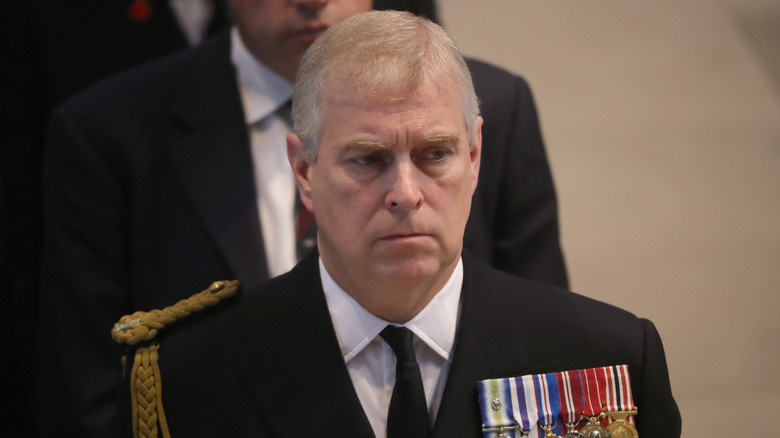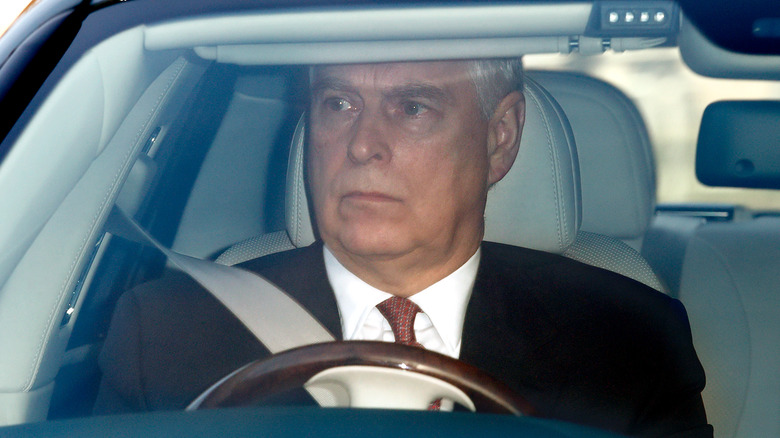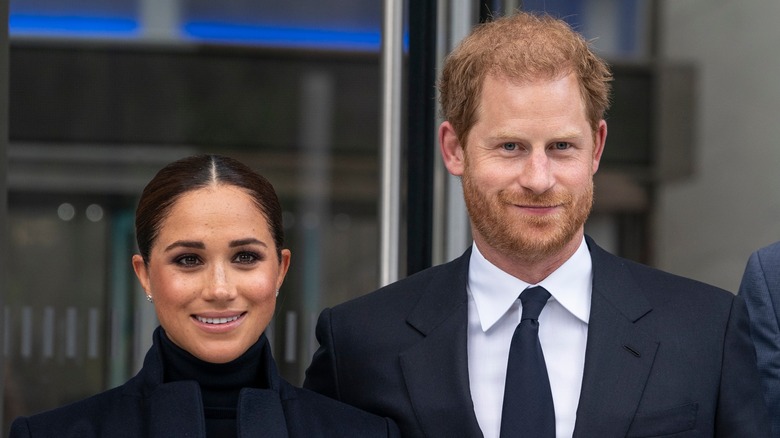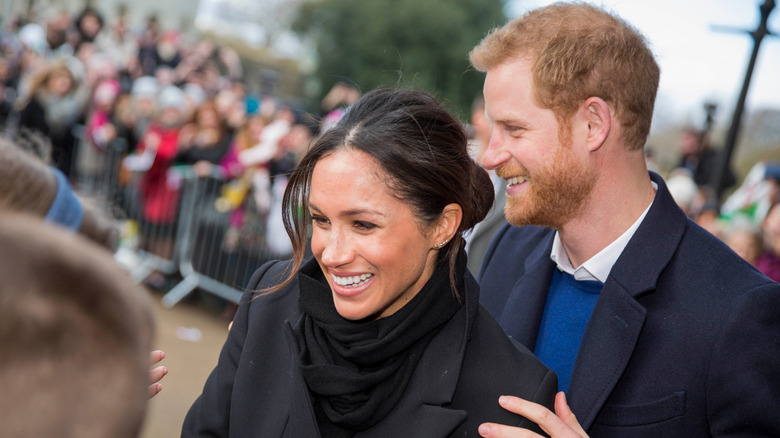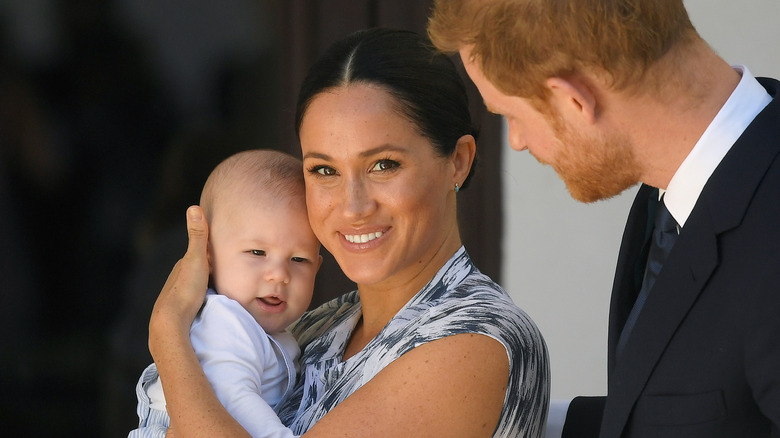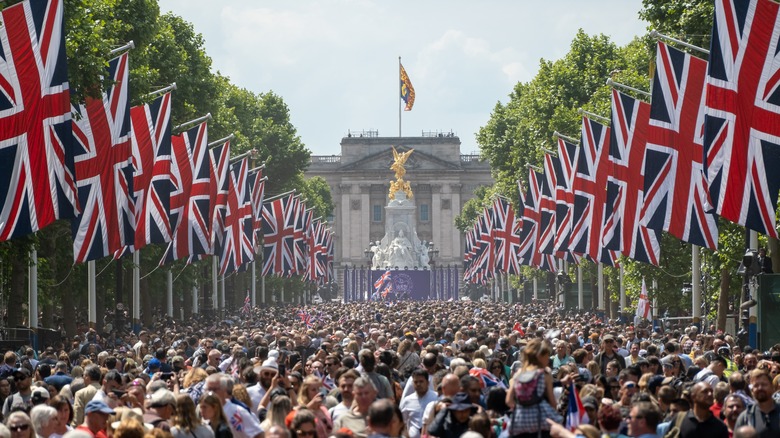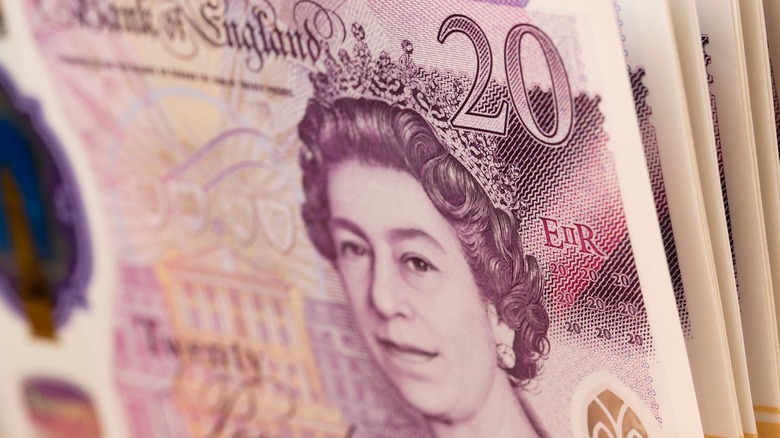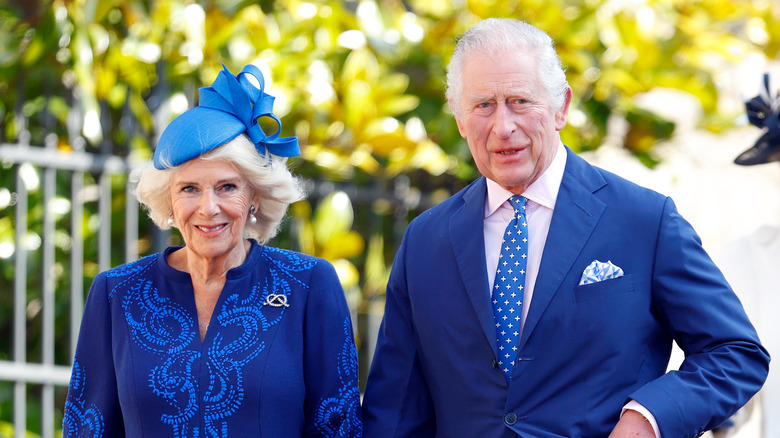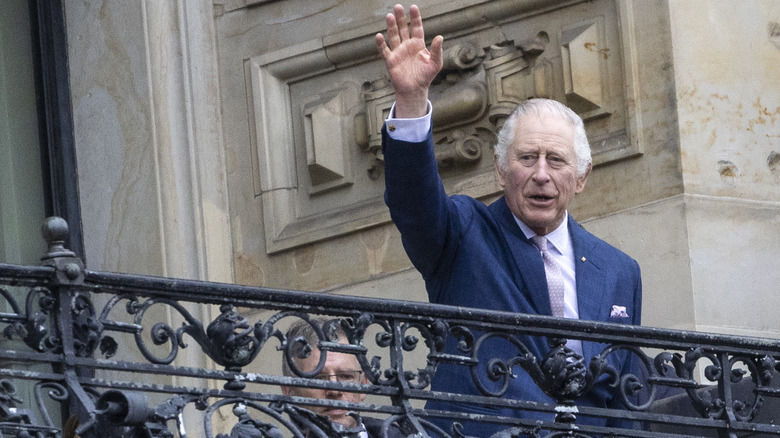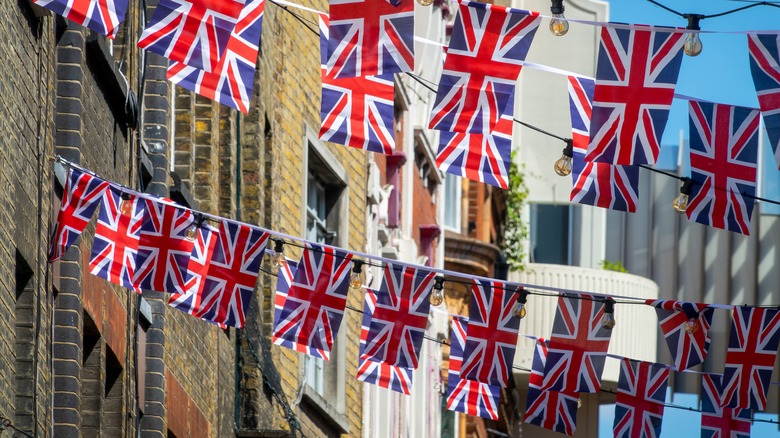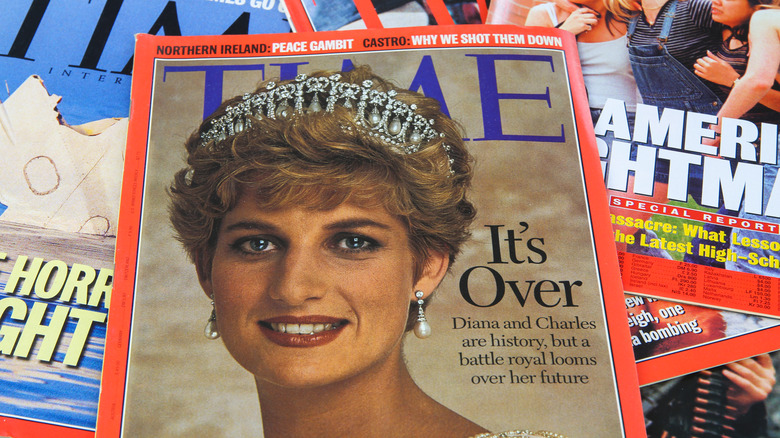All Of The Drama Surrounding King Charles' Coronation
There's something surreal about not getting the job you were trained for until your mid-70s. And there's something even more surreal about having to be on the job for eight months before anyone formally recognized or celebrated your arrival. This is the odd burden of King Charles III, who'd known all his life he'd eventually become king — but only at the cost of losing his mother.
While he'd always known what would happen and no doubt had a rough idea of how his ascension and coronation would unfold — the nearly thousand-year-old traditions surrounding the coronation of a monarch are well-documented — the exact details of timing and planning could only be finalized after he took the throne and after an appropriate period of mourning for Queen Elizabeth II. But while the coronation ceremony is an ancient and revered ritual, it still takes place in the modern world with all its messy drama — from paring down the guest list to handling problematic royal family members diplomatically.
King Charles III's pre-coronation bedtime is causing chaos
For most of his adult life, King Charles III has made sustainability one of his priorities. He's known for his advocacy for environmental issues, including active participation in United Nations Climate Change Conferences and starting an organic farm. He's also advocated for more sustainable, less resource-intensive lifestyles as a way to both improve the quality of life and preserve the environment.
As a man in his 70s, he's embraced the idea of conserving one's resources on a personal level. Knowing that he's no longer in the all-night-partying stage of life and the three days of coronation festivities would require all his energy and attention, he made the sensible decision to plan for an early night the evening before the ceremony, refusing to schedule any official events after 6 p.m. "There have been some logistical challenges caused by the King," said a source (via The Telegraph). "He doesn't want to do anything in the evening in case it tires him out. There will be no partying."
This threw royal party planners for a loop, forcing them to scramble to reorganize the day's many events. Apparently, they'd expected him to follow his mother's example and host a pre-coronation banquet, just as she had.
A long list of A-listers turned down invitations to perform at the coronation
You'd think it would be easy for royals to get pretty much anything they want. After all, doing a royal's bidding and getting on their good side can have lots of advantages and open any number of doors for professional and personal opportunities. So if a royal figure asked you to say, design their clothes or perform at one of your events, it's assumed you'll do it — and of course, brag about it to anyone who'd listen.
But when the coronation planning team reached out to some of Britain's biggest musical stars to invite them to perform, they were dismayed at their responses. Apparently, A-listers require a lot more advance notice than the royal household had thought, and most had already committed to summer tour schedules or had other obligations they couldn't avoid. Among those sending their regrets included Elton John and Harry Styles (King Charles III's personal picks), Ed Sheeran, and the Spice Girls, who had been rumored to be making a reunion performance at the coronation. "Organisers are working against the clock to pull together an exciting line-up but have hit a series of challenges," a source told The Sun.
On the upside, plenty of big-name artists have agreed to perform, including Lionel Richie, Andrew Lloyd Webber, and Kylie and Dannii Minogue.
Prince Andrew is expected to attend – but will be conspicuously sidelined
Almost every family has a black sheep or two they dread seeing at family gatherings, but nevertheless, feel obliged to invite. For the royal family, the black sheep is clearly Prince Andrew. One of King Charles III's younger brothers, Prince Andrew fell into disgrace after being convicted of soliciting a minor for prostitution. Revelations of his close association with sex trafficker Jeffrey Epstein — and accusations that he'd sexually assaulted another woman — have also made him a persona non grata in the royal household. He was stripped of his royal titles and patronages, and for a while, barred from public appearances with the royal family.
But the royal family has not completely abandoned him. He appeared at Queen Elizabeth II's funeral, walking alongside her coffin in the funeral procession. He has also been invited to the coronation, but it will be made abundantly clear he's no longer a working royal in good standing. While other royals will be allowed to wear their ceremonial robes and coronets denoting their royal status, Prince Andrew will be required to wear a regular suit — and he is said to be fuming about this. "Andrew is furious. He's already not playing a part and now he feels he is being disrespected and dictated to over something he is fully entitled to (wear)," a source told the Mirror.
Sexual abuse survivors and advocates are furious about Prince Andrew's invitation
While Prince Andrew's role in King Charles III's coronation will be minimal, the very fact he was invited at all felt like a slap in the face to many survivors of sexual assault and their advocates. Some interpreted his increased public presence in recent months — including his appearance at Queen Elizabeth II's funeral — as a sign that the royal family is trying to rehabilitate his reputation.
Critics made it abundantly clear after the queen's death what they thought of Prince Andrew. For instance, as the queen's funeral procession moved through Edinburgh, a heckler yelled "Andrew, you're a sick old man" (via The Guardian) as Prince Andrew and the rest of the royal entourage passed. While media lawyer Mark Stephens told The Guardian he believes Prince Andrew is "reputationally toast, and will never appear on a royal balcony ever again and has effectively been airbrushed from polite society and the royal family," others feel any official appearance by him, however marginal, is unacceptable. "Every time abusers are allowed to participate in public life without opprobrium, we as a society are saying that we value abusers over their victims," attorney Susan Crumiller told The Guardian. "The message to survivors everywhere is loud and clear — and it is harmful."
Prince Harry will attend the coronation without Meghan Markle
Another source of heartache for King Charles III is the deteriorating relationship between his second son, Prince Harry, and the rest of the royal family, especially his older brother, Prince William. While the royal family publicly supported his relationship and marriage to American actress Meghan Markle, Prince Harry accused his older brother of not doing enough to welcome Meghan into the family. This, plus hostile treatment from the press and a perceived lack of support from the royal household, drove the Sussexes to step down from their official royal duties and decamp to California for a fresh start.
But family is still family, and King Charles is eager to have Harry back in the family fold, if only for a day. But after weeks of speculation, a decision was made — Prince Harry will attend the coronation while Meghan will stay in California with their children Prince Archie and Princess Lilibet. "At this point, it's become so personal," a close friend told People. "Maybe what they wanted wasn't achieved, but at the end of the day, he's going there to support his dad." However, some royal watchers believe Harry shouldn't be part of the coronation at all. "You can't have people like this going to the King's coronation," royal biographer Angela Levin told The Sun. "It's an important occasion and it can't just be all about them — and if they do come it will be all about them."
The Sussexes made their attendance conditional on several demands
To say Prince Harry's relationship with his family is conflicted would be the understatement of the century. On one hand, he's totally over the public scrutiny, backbiting, and demanding workload that comes with royal life, not to mention the perceived lack of personal support from fellow family members. But on the other, he still wants the respect and affection of his family, as well as the public recognition and formal trappings of his royal status.
Before he confirmed his attendance at the coronation, Prince Harry had a few conditions if he and Meghan Markle would attend. While he's no doubt pleased to have received (via email) an official invitation to the coronation, he reportedly presented his family with a list of conditions for his attendance.
Among these was the demand that the couple's two children, Prince Archie and Princess Lilibet, be included in the ceremony and that Harry, Meghan, and the children be allowed to appear with the rest of the royal family in their traditional appearance on the balcony of Buckingham Palace. But some royal watchers thought it was doubtful the royal household would agree to either of these conditions. Small children are typically not invited to such formal royal events because of the "restlessness and tantrums," said a royal insider (via the New York Post). Moreover, balcony appearances have traditionally been a privilege reserved for high-ranking working members of the royal family.
The coronation coincides with Archie's birthday – and some suspect this was intentional
There's never an absolutely perfect date for any big event. No matter what date your wedding, graduation, or other major milestone falls on, it will inevitably overlap with someone else's (unchangeable) plans. And most of the time, the party with the conflict sends their regrets and best wishes and everyone stays friends. But when royal events conflict, gossipers are bound to read a lot into the situation that may or may not be there.
King Charles III's coronation on May 6, 2023, for instance, coincides with the fourth birthday of Prince Archie, the firstborn son of Prince Harry and Meghan Markle. The royal family — and many royal watchers — insist this is merely a coincidence. "Archie's birthday was the last thing they thought about," royal expert Tom Bower told Page Six. "The date was chosen because it's just before the state opening of Parliament and Charles will want to appear as King with his crown and the whole ceremonial (robes)."
Others, however, see something fishy going on. "I think the choice to hold the coronation on Archie's birthday is bizarre, only because it lends to so much speculation and commentary given the current climate of the relationship between King Charles and Prince Harry," royal expert Christine Ross told Marie Claire. "I honestly can't decide if it's a positive indication or a negative one, but it would certainly have been part of the discussion when selecting the date."
Some prominent Britons are miffed at not being invited
Upon taking the throne, King Charles III made it clear that changes would soon be in the works for the hidebound royal family. Among the most radical of these is the slashing of the royal household's largely tax-subsidized budget. For instance, Charles announced that the $1.2 billion earned from the generation of renewable energy on crown lands would be returned to the public treasury, rather than paid to the royal household, per UPI.
In response to Great Britain's struggling economy and growing public resentment of the royalty, the king plans to cut subsidies for royal family members' homes, requiring family members to pay for their own homes and their upkeep. Consistent with his cost-cutting mission, he's planning a much more modest coronation than that of his late mother, slashing the royal guest list from the 8,000 who attended his mother's coronation to 2,000. This has meant that many bigwigs who assumed they'd get an invitation did not. Rejected guests, especially politicians, weren't shy about expressing their displeasure. Members of Parliament, in particular, were reported to be put out, and some lesser nobles even lobbied the Cabinet Office in hopes of getting on the guest list. But King Charles III is standing firm and plans to limit invitations to Parliament members to about two dozen.
The cost and scale of the event are stirring some resentment
King Charles III's mission to trim the royal family's budget includes seriously scaling back his own coronation festivities — he's inviting only a quarter the number of guests that his mother did, and plans a more streamlined and modern ceremony that a royal source said would be "shorter, sooner, smaller, less expensive and more representative of different community groups and faiths" than previous coronations (via the Daily Mail). While Queen Elizabeth II's coronation included extravagances such as specially commissioned chairs that guests could have delivered to their homes, guests to King Charles III's coronation will not receive any such swag.
Still, a "modest" coronation for Britain's royal family would still be considered a blow-out extravaganza by pretty much everyone else, and even some of the coronation expenses deemed essential — such as restoring the 240-year old Gold Coach (a gilded horse-drawn carriage) that King Charles III and Camilla, Queen Consort will ride in — are rubbing some Britons the wrong way.
While the actual coronation budget will be kept under wraps until after the ceremony, some critics question the appropriateness of the festivities and their cost to taxpayers, given the nation's struggles with inflation and other economic challenges. But according to Oliver Dowden, a minister at the Cabinet Office, the king and the government are "mindful of ensuring that there is value for the taxpayer" (via the Mirror).
The crown Queen Camilla plans to wear featured a seriously problematic diamond
King Charles III wants his coronation to be a reflection of modern Britain and his personal values. He's planning a far smaller event than the 8,000-guest extravaganza that was his mother's coronation, with a shorter guest list and a modernized dress code. For instance, he'll be wearing a formal military uniform rather than the traditional silk stockings and breeches worn by previous kings at their coronations.
Perhaps honoring the king's interest in sustainability, Camilla, Queen Consort will be wearing a historic crown rather than commissioning a new one for her coronation as queen — this is something that most monarchs have done in recent history. She plans to wear a crown originally made for Queen Victoria, which until 1937, featured a huge diamond with a troubled history.
The 100-plus carat Koh-i-Noor Diamond was taken by the British East India Company in 1849, after the Second Anglo-Sikh War. While the diamond is no longer set in the crown that Queen Camilla plans to wear, (it was transferred to another crown made for Queen Elizabeth The Queen Mother), it still remains in the possession of the royal family. Some in the Indian government are not happy about this, seeing it as a continuing vestige of their oppression under colonialism. So even though the diamond won't be anywhere near Queen Camilla's head during the coronation, it'll be hard for some to see the crown and not remember its former showcase jewel.
Anti-royalists find the whole idea of the coronation objectionable
Some Britons are quietly rolling their eyes at all the coronation hoopla. For some, it's for personal reasons — King Charles is far less popular a monarch than his mother was, and many have not forgiven him for his shoddy treatment of Princess Diana. Others find the effort and expense of the event wasteful and inappropriate, given the financial woes facing working-class Britons. But a third, more vocal group objects to the very idea of celebrating royalty as a matter of principle.
The anti-royalist group, Republic, has argued that monarchy itself is an antiquated and fundamentally unfair institution, and not one worth celebrating or perpetuating at taxpayer expense. "The coronation is a celebration of hereditary power and privilege, it has no place in a modern society," Graham Smith, Republic's chief executive, told Reuters. Republic advocates for an elected head of state instead of a monarch, and as part of its campaign, staged an event in which the group tried to turn Buckingham Palace into a polling station. The group is also planning a counterprotest at Parliament Square — which faces Westminster Abbey, where the coronation will take place — on the day of the coronation. But don't expect them to show up with pitchforks and torches — they are coordinating their plans with London's police and plan to keep their protest pointed but peaceful.
Some UK nations feel ambivalence about the coronation
The monarch of the British royal family is supposed to be the supreme ruler of the United Kingdom and the Commonwealth. However, not all of King Charles III's subjects are feeling the love. In Wales and Scotland, many locals are quietly fuming about the coronation and the hype around the royal family in general — and they have plenty of historical, cultural, and political reasons for feeling a bit salty.
For instance, in Wales, where nationalism is on the rise and an active movement is afoot to revive and revitalize the Welsh language, there is still local resentment of the assassination of Prince Daffyd ap Gruffydd in 1283. The prince's death ended the Welsh royal line, securing the line of succession for the English. To rub even more salt in the wound, the royal family then declared that the oldest son of the king would thereafter be known as the Prince of Wales (nice!), and some in Wales have not gotten over this insult. "As far as the coronation goes, there's a feeling of, well, ambivalence — and that at best," Welsh bookstore owner Selwyn Jones told the Los Angeles Times.
The memory of Princess Diana looms large over the festivities
King Charles III won't be the only one officially accepting a title at the coronation. His second wife, Camilla, Queen Consort, will also be ceremonially crowned, cementing her position as a royal queen. This, of course, follows the late Queen Elizabeth II's "sincere wish" that Camilla be recognized as queen consort upon her son's ascension to the throne.
While the late queen's request sent an unambiguous message that King Charles III's longtime mistress-turned-wife should be accepted without question as an official member of the royal family in good standing, not all of her subjects are ready to roll out the red carpet for the new queen consort. Devotees of the late Princess Diana, including her former private secretary, Patrick Jephson, are grumbling about how the royal family is whitewashing the adulterous history between then-Prince Charles and Camilla Parker-Bowles and the heartache it brought to Princess Diana.
"An honest account of her extraordinary ascent would acknowledge that Camilla's actual status in the King's past and in the country's future was cloaked behind a long succession of creative palace statements," Jephson wrote in the Daily Mail.
